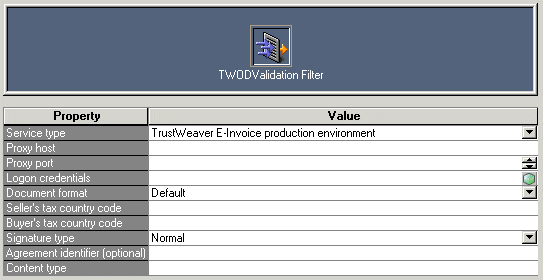|
Note:
|
To be able to specify the document format using the Default option, you must define the StrsSignatureFilterOriginalContentType metadata, see Defining document types with metadata.
|
|
Figure 9
|
|
TrustWeaver E-invoice test environment – Used during the development and testing phases. Does not produce legally binding digital signatures.
TrustWeaver E-invoice production environment – Used during the production phase. Produces legally binding digital signatures.
|
|||||||
|
The document format of the signed e-invoice to be validated. You can use the Default option, select a specific document format, or specify the document format using a variable.
Default – The document format is mapped against the original content type of the invoice before it was signed (“content type – Document format” in the list below):
PDF – Used when the format of the e-invoice is PDF.
CXML – Used when the format of the e-invoice is cXML (commerce XML).
XML – Used when the format of the e-invoice is an XML format other than cXML.
GENERIC – Used when the e-invoice is treated as binary data and has any format.
|
|||||||
|
For example: $sellerscode
|
|||||||
|
For example: $buyerscode
|
|||||||
|
Normal – Creates legal, country compliant e-invoices with a protection level based on the CAdES-A or XAdES-A profile, intended for B2B (business-to-business) scenarios. This option should normally be used.
Simple – Creates legal e-invoices with a protection level based on the CAdES-T or XAdES-T profile. This option can be used in certain B2C (business-to-consumer) scenarios for signing invoices to be sent to the Buyer. A faster signature is used, but there is no evidence that the e-invoice was validated upon reception and there is no long term validation information stored with the signature. To ensure a correct validation over time, the Seller must still archive a copy signed with the Normal option.
|
|||||||
|
Using Signature type > Simple affects the signature applied. If you are uncertain of the protection level requirements, always use Signature type > Normal.
|
|||||||
|
The content type to be used for the final delivery. For example, application/pdf. You can configure a specific content type, or you can configure the content type using a variable.
|

